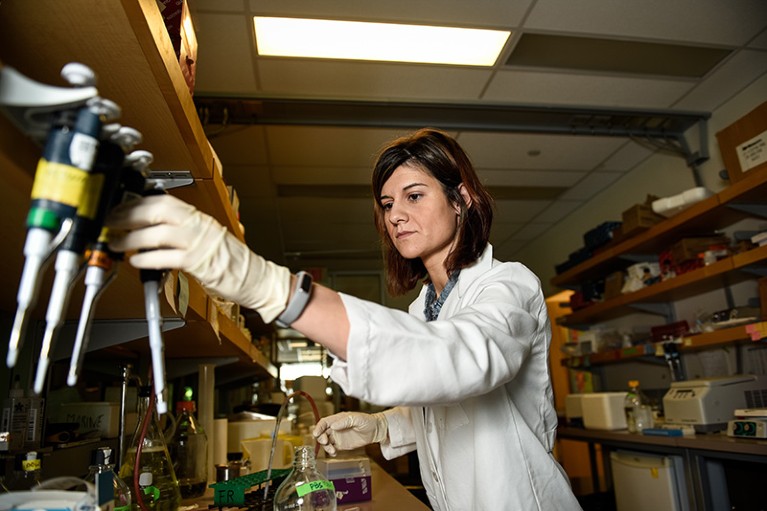Postdoctoral researchers need to learn skills that will help them in industry.Credit: SFU Beedie
In 2022, during the final year of his PhD, one of us (M.S.K.) applied for at least ten faculty positions. He had more than ten first-author publications, along with patents, several major awards and scholarships, numerous conference presentations and significant teaching experience. Just one application led to an official interview, and that did not turn out to be the right fit. The experience taught M.S.K. that finding a tenure-track faculty position as a newly minted PhD holder is almost impossible1; applicants must have at least one high-impact postdoc position on their CV. There is an oversupply of PhD holders, and the laws of supply and demand dictate that the postdoc journey will become even more challenging as the competition for tenured positions becomes fiercer. The global coronavirus pandemic has further damaged postdocs’ career prospects, with the path to principal investigator constantly narrowing and permanent lab-leadership roles becoming increasingly scarce.
Postdoctoral fellowships aim to draw talent and retain it by nurturing postdocs’ leadership potential, preparing participants for successful and impactful careers in research and education. However, a prevailing mindset often relegates postdocs to supporting roles as relatively expendable labour in academia, and this must be reassessed.
Many argue (and we are among them) that giving postdocs greater autonomy will allow them to thrive as scholars beyond the influence of their principal investigator, albeit with their support. Programmes must teach the importance of embracing failure as being a normal part of a scientific career. The persistent under-representation of postdocs from marginalized communities in science, technology, engineering and mathematics (STEM) must also be addressed.
Skill gaps
Research shows that postdoc recruitment often prioritizes short-term gains for the laboratory, while neglecting long-term success for individual scholars2. Many postdocs aiming for tenure-track roles receive insufficient support from their principal investigators and struggle to find non-academic jobs, because they might lack specific skills that employers want. They need improved career guidance and programmes that teach them about entrepreneurship, expanding their career options and increasing their capacity to tackle the many problems3 facing humanity today.

Postdoc career optimism rebounds after COVID in global Nature survey
Alongside research expertise, postdocs need comprehensive leadership training, including grounding in mentorship, project management, applying for grants, networking, teaching and effective communication. There should also be a focus on self-articulation. By this, we mean giving postdocs the ability to communicate their skills, qualifications and research capabilities in a way that makes sense to potential employers, policymakers, industry professionals and collaborators. Postdocs should routinely co-author grant proposals in partnership with their principal investigators to benefit from their support and guidance, while acquiring the resources to launch independent research-focused careers.

Falling behind: postdocs in their thirties tire of putting life on hold
An increasing number of PhD holders are leaving academia — perhaps swayed by higher salaries and job-satisfaction scores in industry4. But Nature’s 2023 global survey shows that 65% of postdocs are planning careers in academia, a result similar to that from the 2020 survey (63%). Not all of them will be able to get such jobs, underlining the importance of honest and transparent career guidance. Principal investigators and institutions should champion the exploration of diverse career pathways, in academia and beyond, and this should begin during PhD programmes. It is important to normalize and facilitate smooth transitions into industries where scholars’ talents and scientific expertise can be used to best advantage.
Entrepreneurial capabilities
The Invention to Innovation (i2I) programme is a practical model for addressing these gaps. Developed in 2015 at Simon Fraser University in Burnaby, Canada, and expanded across the country in partnership with other institutions, it helps graduate students and postdoctoral scholars to navigate multifaceted career paths. The i2I programme is now active at more than 25 Canadian universities, supporting scientists and engineers as they “build translational skills and an entrepreneurial mindset to create comprehensive and compelling plans to overcome challenges and bring their research to impact”, according to Simon Fraser University.

How ChatGPT is transforming the postdoc experience
The programme provides academic assistance (through a series of modules on innovation skills and knowledge applied to the scholar’s own research) and financial help (in partnership with the non-profit national research organization Mitacs) to graduate students whose research has the potential to be commercialized. When they finish i2I, the students have not only expertise in their discipline, but also the capacity (and credentials) to situate their work in the marketplace. Postdoctoral scholars supported by this programme can choose one of three pathways, to become successful translational researchers in academia, leaders of innovation in industry or founders of scalable, science-based spin-off ventures. The entrepreneurial capabilities developed by these STEM researchers enhance the translation of breakthrough inventions from university research5.
Postdoctoral scholars need to be trained as agents of innovation and catalysts for change in the scientific ecosystem. It is easy to imagine a future in which postdoctoral training programmes do not solely advance supervisors’ agendas and are not mere stepping stones in a career. We want postdoctoral appointments to be transformative experiences that nurture the next generation of research leaders across academia and industry. Both sectors stand to benefit from a cohort of postdoctoral scholars armed with research acumen, leadership prowess and an array of transferable skills. We urge the academic community to embrace systematic change that will deliver more empowered and resilient future research leaders capable of shaping their own career trajectories and the future of scientific discovery for the betterment of society.
